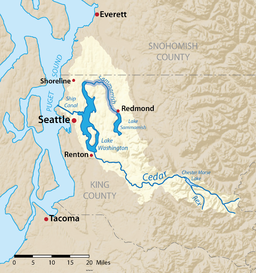Sammamish River
| Sammamish River | |
| Sammamish Slough, Squak Slough | |
| River | |
| Country | United States of America |
|---|---|
| State | Washington |
| County | King |
| Source | Lake Sammamish |
| - elevation | 30 ft (9 m) |
| - coordinates | 47°39′09″N 122°06′24″W / 47.65250°N 122.10667°W |
| Mouth | Lake Washington |
| - elevation | 16 ft (5 m) |
| - coordinates | 47°45′12″N 122°15′30″W / 47.75333°N 122.25833°WCoordinates: 47°45′12″N 122°15′30″W / 47.75333°N 122.25833°W |
| Length | 14 mi (23 km) |
| Discharge | for USGS gage 12125200 near Woodinville, Washington |
| - average | 304 cu ft/s (9 m3/s) |
| - max | 2,830 cu ft/s (80 m3/s) |
| - min | 25 cu ft/s (1 m3/s) |
|
Map of the Lake Washington drainage basin with the Sammamish River highlighted
|
|
The Sammamish River (also known as Sammamish Slough) flows through north King County, Washington for about 14 miles (23 km), draining Lake Sammamish into Lake Washington. Along its course, the Sammamish River flows through Redmond, Woodinville, Bothell, and Kenmore.
The river is named after the native people who once lived along its entire length.
The Sammamish River begins as an outlet on the north shore of Lake Sammamish, which in turn is fed by several creeks that make up the headwaters of the Sammamish River basin. The most important of these is Issaquah Creek.
The river flows north from the lake through the city of Redmond. The tributary Bear Creek joins the Sammamish from the east, also containing the waters from Evans Creek and Cottage Lake Creek.
After passing through Redmond and parts of unincorporated King County, the Sammamish enters Woodinville where it turns northwest and then west. Little Bear Creek joins the Sammamish at this western turning point from the north. The river continues to bend in a generally westward direction, where it is joined from the north by North Creek in Bothell near the University of Washington, and Swamp Creek in Kenmore.
The Sammamish River enters Lake Washington on the west side of Kenmore.
The Sammamish River basin covers an area from Everett in the north to May Valley in the south. It is part of the larger Lake Washington-Cedar River drainage . The total basin drainage area covers approximately 626 km2 (242 mi2), including the surface of Lake Sammamish. Big Bear Creek is the largest of the four major tributaries that feed the river followed by Little Bear Creek, North Creek, and Swamp Creek. There is also a significant amount of more diffuse drainage, primarily originating from the hills and valley to the west of the river.
...
Wikipedia


